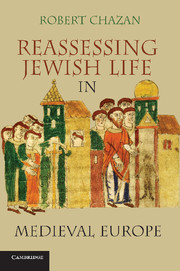Book contents
- Frontmatter
- Contents
- Acknowledgments
- Prologue: Group Narratives: Their Tenacity and Their Accuracy
- Introduction: The Emergence of Medieval European Jewry
- Part I Historical Schemes
- 1 The Jewish Middle Age: The Jewish View
- 2 The Jewish Middle Age: The Christian View
- 3 The European Middle Ages
- 4 The European Jewish Middle Ages
- Part II Historical Themes
- Bibliography
- Index
1 - The Jewish Middle Age: The Jewish View
Published online by Cambridge University Press: 05 June 2012
- Frontmatter
- Contents
- Acknowledgments
- Prologue: Group Narratives: Their Tenacity and Their Accuracy
- Introduction: The Emergence of Medieval European Jewry
- Part I Historical Schemes
- 1 The Jewish Middle Age: The Jewish View
- 2 The Jewish Middle Age: The Christian View
- 3 The European Middle Ages
- 4 The European Jewish Middle Ages
- Part II Historical Themes
- Bibliography
- Index
Summary
Many human communities have segmented their sense of history into three parts: past – an early idyllic period; present – a period of serious decline; and future – an anticipated return to the idyllic past, replete with a sense of the everlasting nature of this third and final period. Christianity and Judaism each adumbrated a vision of its tripartite history, with of course differing perspectives on what constituted past, present, and future. In fact, Christians developed a sense of both tripartite Christian history and tripartite Jewish history. For our purposes, it is important to gain a sense of both the Jewish and Christian views of tripartite Jewish history, with a focus on the middle period of decline in Jewish fortunes.
In traditional Jewish thinking, this middle period of decline involved the loss of political independence, the destruction of Jerusalem and its sacred temple, and transformation of the Jews into a people in exile, all of which were attributed to Roman domination of Palestine in the first century and were clustered around the symbolic date of the year 70. In fact, two of these three developments actually took place over an extended period of time, predating and postdating the year 70. In the eighth pre-Christian century, the Judean kingdom had lost its political independence as a result of Assyrian conquest and remained a subjugated polity down through the second pre-Christian century – under the Babylonians, Persians, and Greeks. After a brief eight decades of renewed Jewish independence under the Hasmonean ruling family, in 63 bce Rome bloodlessly asserted imperial domination of Judea. Thus, Jewish political independence ended long before the year 70.
- Type
- Chapter
- Information
- Reassessing Jewish Life in Medieval Europe , pp. 19 - 37Publisher: Cambridge University PressPrint publication year: 2010



